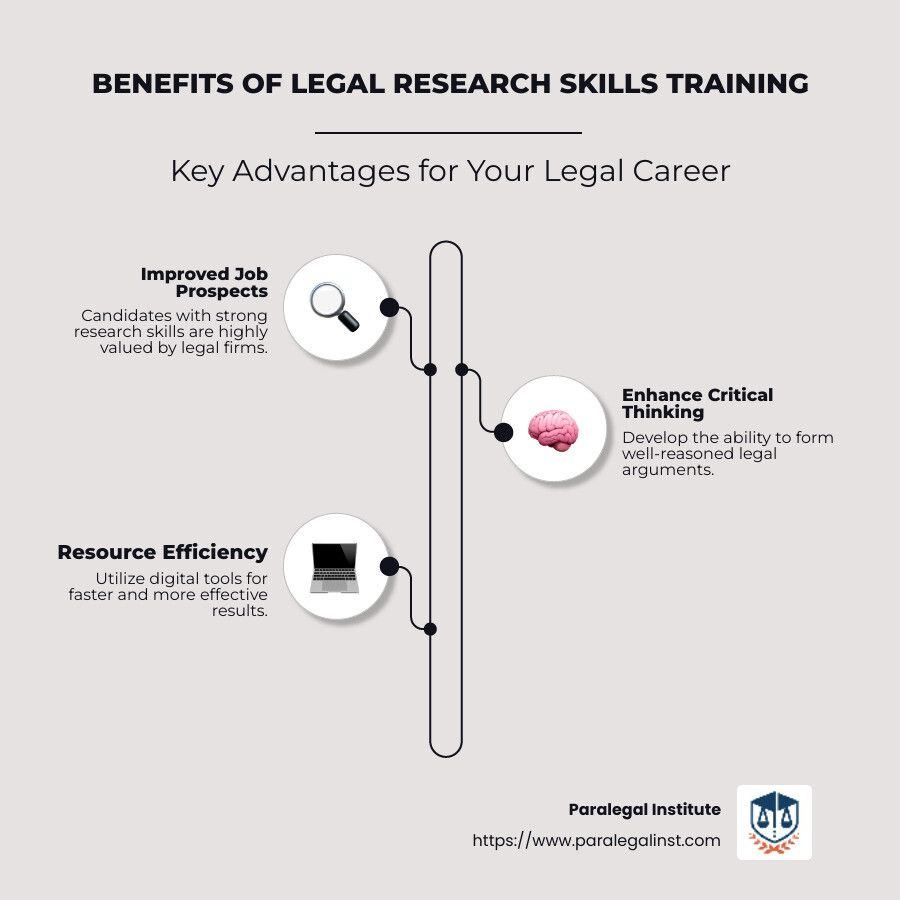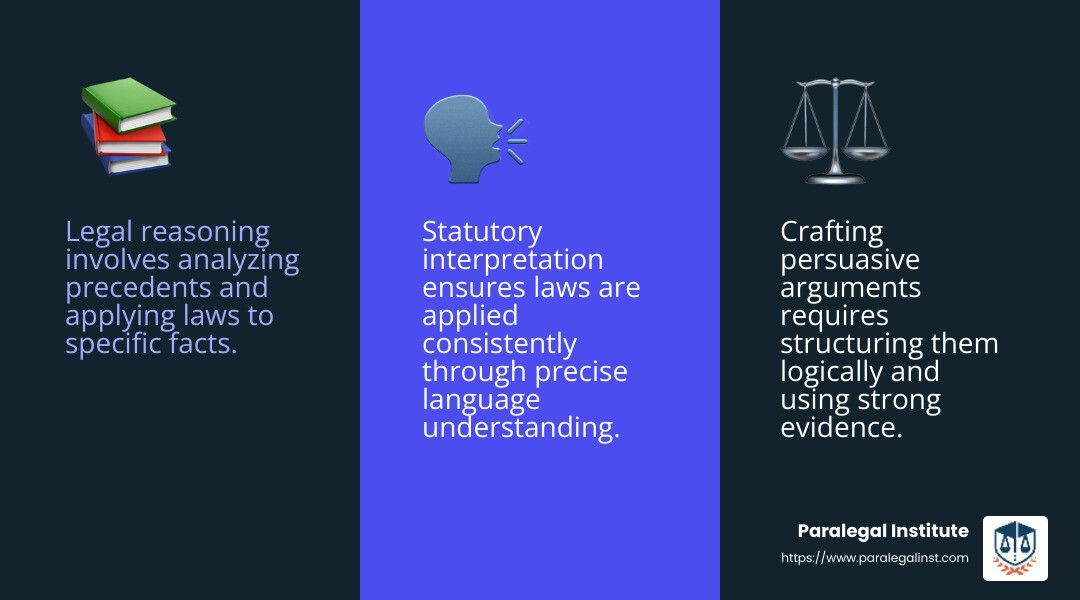Legal Research Skills: Training for Success
Legal research skills training is essential for anyone seeking to steer the complex world of law effectively. Whether you're a budding paralegal or an aspiring attorney, mastering these skills ensures you can efficiently find, analyze, and apply legal information. Here's why it's crucial:
- Improves Job Prospects: Legal firms highly value candidates proficient in research.
- Promotes Critical Thinking: Develop the ability to form well-reasoned legal arguments.
- Saves Time and Resources: Learn to use digital tools for faster, more effective results.
Legal research skills training opens doors to a range of opportunities. From increased job readiness to greater career advancement potential, these skills are the backbone of any successful legal career.
I am Matthew Pfau, and with a background in estate planning and personal injury law, I've seen the transformative power of legal research skills training. With practical experience in training paralegals and developing educational curricula, I am passionate about empowering others to excel in their legal careers. Stay tuned as we dive deeper into developing these vital skills.

Understanding Legal Research Skills
Legal research skills are the backbone of effective legal practice. Mastering these skills involves several key components: legal reasoning, persuasive arguments, and statutory interpretation. Let's explore each of these.
Legal Reasoning
Legal reasoning is the process of applying the law to specific facts. It's about understanding how the law works in real-world situations. This skill is crucial because it allows legal professionals to analyze cases and predict outcomes based on existing legal principles.
- Analyzing Precedents: Lawyers and paralegals often look at previous cases to determine how similar situations were resolved.
- Critical Thinking: Legal reasoning requires evaluating all sides of an issue to make informed decisions.
Persuasive Arguments
Crafting persuasive arguments is another essential skill in legal research. This involves presenting facts and legal principles in a way that convinces a judge or jury.
- Structuring Arguments: A well-structured argument follows a logical progression, making it easier for others to understand and accept.
- Using Evidence: Persuasive arguments rely on strong evidence, which can be gathered through thorough research and analysis.
Statutory Interpretation
Statutory interpretation is the process of determining the meaning of laws and how they apply to specific situations. This skill is vital in ensuring that the law is applied consistently and fairly.
- Understanding Language: Legal professionals must be adept at understanding the precise language used in statutes.
- Contextual Analysis: Interpreting statutes often involves considering the broader context, including legislative history and intent.

By honing these skills, legal professionals can provide more effective representation and advice. They become adept at navigating the complexities of the legal system, making them invaluable assets to their firms and clients.
Next, we will explore how legal research skills training can be improved through online courses and practical certifications, leading to career advancement and increased job readiness.
Legal Research Skills Training
If you're looking to enhance your legal research skills, engaging in structured training is an excellent choice. Our Paralegal Institute offers comprehensive courses tailored to boost these skills, providing flexibility and convenience for all learners. Let's delve into how these options can elevate your success.
Online Courses
Online courses offer a flexible and accessible way to learn legal research skills. They fit seamlessly into busy schedules and allow you to progress at your own pace. Our courses are crafted by experienced legal professionals and encompass a broad spectrum of topics, from fundamental research techniques to sophisticated legal analysis.
- Interactive Learning: Our online courses include interactive elements such as quizzes, discussion forums, and live sessions, enhancing engagement and solidifying your understanding.
- Comprehensive Curriculum: The curriculum covers essential skills like utilizing legal databases, conducting statutory interpretation, and crafting persuasive arguments.
Paralegal Certificate
Earning a Paralegal Certificate through our courses is a significant step towards advancing your legal career. These certificates demonstrate your dedication to mastering legal research skills and enhance your resume.
- Resume Booster: Completing a course and earning a Paralegal Certificate showcases your commitment to professional growth.
- Skill Validation: The certificate validates your skills, giving you a competitive edge in the legal job market.
Practical Skills
The core of our training focuses on developing practical skills, crucial for applying your knowledge in real-world scenarios.
- Hands-On Experience: Our courses include simulations and projects that replicate actual legal tasks, providing invaluable hands-on experience.
- Problem-Solving: The training emphasizes problem-solving abilities, equipping you to address complex legal issues confidently.
By investing in training at the Paralegal Institute, you're not just learning theoretical concepts—you're acquiring the practical skills necessary to excel in your legal career. Whether you're a paralegal or an aspiring attorney, these skills are indispensable for career advancement and enhancing job readiness.
Advanced Legal Research Techniques
Mastering advanced legal research techniques is essential for anyone in the legal field. These techniques not only save time but also ensure accuracy and comprehensiveness in research. Let's explore some key tools and methods that can enhance your legal research skills.
Computer-Assisted Research
With the advent of technology, computer-assisted research has transformed the way legal professionals gather information.
- Efficiency: Digital tools allow quick access to a vast array of legal documents, case law, and statutes.
- Precision: Advanced search capabilities enable you to pinpoint relevant information accurately, using keywords, filters, and other search parameters.
- Time-Saving: Automated features streamline the research process, significantly reducing the time spent on manual searches.
Online Databases
Our courses provide access to various online databases, offering invaluable resources for legal research.
- Variety of Sources: Gain access to a multitude of legal documents, scholarly articles, and practice guides.
- Up-to-Date Information: These databases are regularly updated, ensuring you have the most current information available.
- Collaboration: Features like shared folders and document annotations facilitate collaboration with colleagues.
By leveraging these advanced techniques through our courses, you can significantly improve your research capabilities, making you more effective and efficient in your legal work.
Benefits of Legal Research Skills Training
Investing in legal research skills training can be a game-changer for your career. Let's explore the key benefits that make this training essential for anyone in the legal field.
Career Advancement
Legal research skills are a must-have for moving up the career ladder. Employers value candidates who can efficiently gather and analyze legal information. By mastering these skills, you position yourself as a valuable asset to any legal team.
- Stand Out: Having advanced research skills sets you apart from your peers, making you more attractive to potential employers.
- Leadership Opportunities: Proficiency in legal research can open doors to leadership roles, as you'll be equipped to guide and mentor others in effective research practices.
Salary Potential
Your ability to conduct thorough and precise legal research can directly impact your earning potential. As legal practices increasingly rely on digital research tools, those who are adept at using them are in high demand.
- Higher Earnings: Mastery of legal research tools like WESTLAW can lead to better job offers and salary negotiations.
- Specialized Roles: Advanced research skills can qualify you for specialized positions that often come with higher pay scales.
Job Readiness
Being job-ready means having the skills and knowledge employers are looking for right now. Legal research skills training ensures you're prepared to hit the ground running.
- Immediate Impact: With training, you can contribute effectively from day one, reducing the learning curve and increasing your value to the firm.
- Adaptability: As the legal landscape evolves, your training will help you adapt to new tools and methodologies, keeping you relevant in a competitive job market.
By enhancing your legal research skills, you're not just improving your ability to find information—you're boosting your career prospects, earning potential, and readiness for future challenges. Next, we'll tackle some frequently asked questions about legal research skills training, including its accessibility and relevance for non-lawyers.
Frequently Asked Questions about Legal Research Skills Training
What are the six basic steps of legal research?
Legal research is like solving a puzzle. You need to follow a series of steps to find the right pieces. Here are the six basic steps:
- Preliminary Analysis: Start by understanding the legal issue at hand. What is the problem? What are you trying to solve?
- Research Strategy: Plan your approach. Decide which resources you'll use, like online databases or legal libraries.
- Search for Authority: Look for statutes, cases, and regulations that relate to your issue. This involves using tools like WESTLAW to find relevant information.
- Evaluate and Analyze: Not all information is equal. Assess the relevance and authority of your findings. Are they up-to-date and applicable?
- Organize Information: Keep your findings structured. Use folders or digital tools to categorize your research for easy access.
- Apply and Report: Use your research to form legal arguments or advice. Present your findings clearly, whether in a memo, brief, or oral presentation.
Can you do legal research without a law degree?
Absolutely! Legal research isn't just for lawyers. Paralegals, law librarians, and even non-lawyers can conduct legal research. With the right training, anyone can learn to steer legal databases and interpret legal texts.
- Non-Lawyers: Many roles in the legal field don't require a law degree but do require strong research skills. Paralegal positions, for instance, often focus on gathering and analyzing legal information.
- Training Opportunities: Programs like those offered by the Paralegal Institute provide a pathway to develop these skills without needing a law degree. This opens doors for career opportunities in the legal field.
Do lawyers need research skills?
Yes, they do! Research skills are a cornerstone of legal practice. Employers seek attorneys who can efficiently gather and analyze information.
- Employers' Expectations: Law firms and legal departments expect lawyers to be adept at using research tools and databases. This ensures they can provide accurate and timely legal advice.
- Databases: Familiarity with databases like WESTLAW is crucial. These platforms help lawyers find case law, statutes, and other legal materials quickly.
In summary, legal research skills training is not just about acquiring knowledge—it's about becoming a resourceful and adaptable legal professional. Whether you're a non-lawyer or an aspiring attorney, mastering these skills can significantly improve your career prospects.
Conclusion
At the Paralegal Institute, we believe that practical skills are the key to success in the legal world. Our programs are designed to equip you with the hands-on experience needed for immediate workforce entry.
Whether you're just starting your journey or looking to improve your existing skills, our Paralegal Certificate Program offers a comprehensive curriculum that focuses on real-world applications. This 15-week course, available both online and in-person, is crafted by practicing legal professionals who know what it takes to succeed in the field.
With a focus on legal research skills training, our courses prepare you to tackle complex legal issues with confidence. You'll learn how to effectively use legal resources, draft persuasive arguments, and interpret statutes—all critical skills for any paralegal.
The legal landscape is constantly evolving, and so is our training. We ensure that our students are not just ready for today's challenges but are also prepared for tomorrow's opportunities. By mastering these practical skills, you'll be well on your way to a successful career in the legal industry.
Invest in your future with the Paralegal Institute and become a valuable asset in any legal setting.
More from The Paralegal Hub
Ready for a Career Change?
Paralegal Institute. All Rights Reserved.










